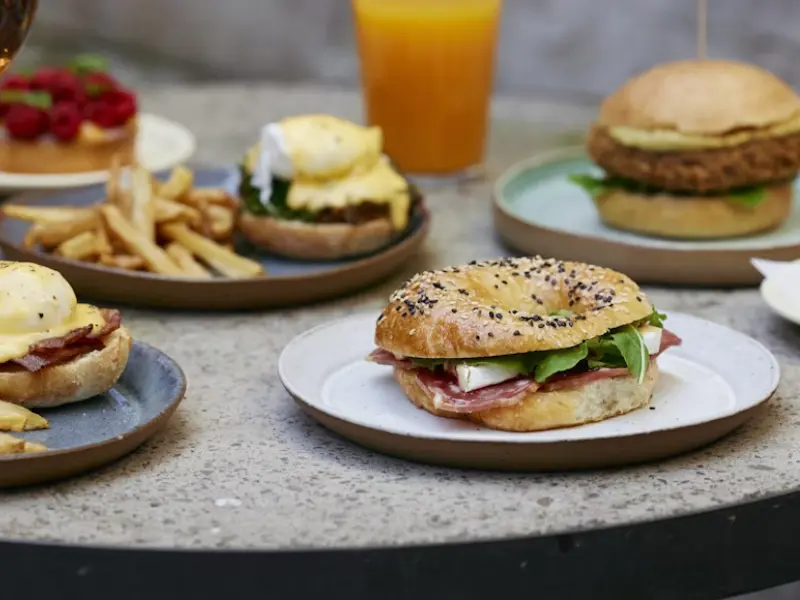Effective marketing strategies to grow your food business and build strong B2B partnerships.
Promoting your business in the B2B food marketing space can be a powerful driver for growth. Corporate clients typically place larger, more frequent orders and often engage in long-term food service contracts that provide steady revenue.
The global B2B food market is expected to reach US$ 2.03 trillion by 2025 and grow to US$ 2.77 trillion by 2034. This highlights the increasing demand for efficient food supply solutions tailored to businesses and institutions.
In this guide, you’ll learn how B2B sales can accelerate your business growth, the best channels to promote your brand, and how to prepare your kitchen to secure bigger contracts, along with tips to structure your operations for this audience.
Read more: 20 Catering Trends to improve your business success!
Why B2B Can Boost Your Food Business Growth
Selling to the B2B market can transform the predictability and growth potential of your scalable food business. Unlike individual consumers, corporate clients often place recurring, high-volume orders with the possibility of stable, long-term contracts.
Examples of B2B clients include:
- Offices requiring daily meals or internal events;
- Schools seeking reliable food suppliers for student meals;
- Hospitals needing consistent, balanced meal provisions;
- Organizers of corporate or social events.
Catering
Corporate catering partnerships and buffet services represent a high-value opportunity. They serve corporate events, meetings, trainings, product launches, and social gatherings with higher average order values and more predictable demand.
In the U.S., this market generated over US$ 60 billion in 2022 and is projected to grow at an average annual rate of about 7.7% through 2030. This signals ongoing strong demand for practical and professional meal solutions tailored to events and businesses.
Wholesale Food
Operating in the wholesale model allows kitchens to supply products in bulk to grocery stores, cafes, specialty markets, and even other brands outsourcing part of their production. This channel is ideal for businesses that already have scale production capabilities and want to diversify revenue streams.
Projections indicate that the U.S. food wholesale sector will reach around US$ 298 billion by 2025. This demonstrates the significant opportunity for brands that can balance cost, quality, and reliable delivery.
Bulk Meal
Producing meals in bulk, or bulk meal prep, is a strategic option to serve institutions, corporate meal programs, and partnerships with networks or platforms that distribute ready-to-eat food. Although this requires organization, it offers high volume in return.
Globally, the bulk food ingredients market is expected to exceed US$ 527 billion by 2034, up from about US$ 357 billion in 2025. With steady growth and consistent demand, this model can ensure profitability for well-structured operations.

Best Channels to Promote Your Food Business
Winning B2B clients demands a more strategic approach than marketing to individual consumers. Businesses and institutions look for reliable partners with proven delivery capabilities and a professional image.
Investing in prospecting channels that build credibility and open doors to meaningful connections with decision-makers is essential. Below are some effective strategies:
- Attending Industry Trade Shows: Gastronomy and corporate service events are great platforms to showcase your brand, network, and generate qualified leads. Beyond visibility, these events let you demonstrate your unique strengths through tastings and customized materials.
- Local Restaurant Associations: Joining local or regional food industry groups can ease access to partnerships, suppliers, and institutional contracts. These organizations often host events, offer training, and create business opportunities for members.
- LinkedIn Messaging: LinkedIn is a valuable tool to directly reach purchasing managers, HR professionals, marketing teams, and event coordinators responsible for corporate food service contracts. Invest in well-crafted direct messages and targeted ads for your audience.
- Targeted Email Marketing: With a qualified contact list, email marketing becomes an efficient way to nurture relationships with potential B2B clients. Share relevant content like corporate menus, success stories, special offers, and details about logistics or certifications.
- Strategic Partnerships and Referrals: Building partnerships with event companies, suppliers, corporate spaces, or coworking hubs can lead to valuable referrals. Often, strong contracts come through indirect connections, making local ecosystem relationships a long-term, high-return strategy.
Digital Tools to Elevate Your Outreach
Beyond traditional methods, digital platforms can boost your business’s visibility and credibility in the B2B market. Specialized marketplaces, supplier networks, and review directories connect your brand to qualified buyers efficiently and professionally.
Here are some key platforms to consider:
- FoodMaven: Connects suppliers with surplus food to buyers seeking cost savings. Offers fresh products, dairy, and meats at competitive prices, focusing on waste reduction and fast delivery.
- RangeMe: Links food brands with major retail and foodservice buyers, allowing producers to showcase products to chains like Whole Foods, Walmart, and Sysco. Facilitates B2B contract opportunities with global reach.
- Notch: Automates order management between restaurants and food suppliers. Enables centralized ordering, real-time delivery tracking, and inventory control, minimizing errors and streamlining operations.
- Cater Nation: Specializes in corporate catering, gathering restaurants and buffet services in one place. Manages the entire process from order to delivery with diverse menus and customized service.
- BioLinked: Focuses on organic food, connecting suppliers, manufacturers, and B2B buyers worldwide. Highlights certified products with a focus on traceability and authenticity.

Positioning Your Kitchen for Bigger Deals
Securing corporate clients requires more than just a good menu. It’s essential to convey trust, professionalism, and operational capability. B2B businesses look for partners ready to handle large-scale demands consistently and reliably.
Key factors that demonstrate your kitchen’s readiness for larger contracts include:
Strong Branding
A well-developed food business branding strategy positions your business as trustworthy. Clear visual identity, professional online presence, and consistent communication boost perceived value and differentiate you from competitors.
Consistent Food Quality
Corporate clients expect every order to meet the same standards of taste, presentation, and safety. Well-defined production and quality control processes ensure this consistency.
Compliance with Health Regulations and Licenses
Being up-to-date with all legal requirements and certifications shows responsibility and can be decisive in winning contracts. It reflects seriousness and commitment to food safety.
Capacity to Handle Large Volumes
Proper infrastructure, trained staff, and optimized workflows prove your kitchen can fulfill high-volume orders without sacrificing quality.
Reliable and Timely Delivery Systems
Organized logistics with tracking and effective communication increase client confidence, ensuring orders arrive on time and in perfect condition. These aspects are crucial when developing food delivery partnerships.
Pricing and Packaging for the B2B Audience
Setting prices and creating packaging strategies for B2B clients requires a tailored approach that addresses this market’s unique needs. Consider the following aspects to build a winning proposal:
Flexible Pricing Tiers
B2B purchase volumes vary widely, so offering different price levels based on order size is key. This accommodates both regular buyers and those testing new suppliers.
Tiers can include volume discounts, incentives for recurring orders, and special conditions for long-term contracts. Flexibility helps retain clients and adapt to changing buyer needs.
Samples to Facilitate Buying Decisions
Providing samples is an effective way to build trust with B2B clients. It allows buyers to assess quality, flavor, and presentation before committing to larger orders.
Samples also demonstrate attention to detail and consistent standards, which are crucial for companies seeking dependable suppliers for bulk orders.
Service Packages to Add Value
Bundling products or services simplifies the purchasing process for corporate clients. This can include complete solutions for events or catering, plus extras like scheduled deliveries.
Packages increase value for customers, differentiate your kitchen from competitors, and make negotiations smoother, encouraging longer contracts.
Professional Presentation of Commercial Proposals
To win B2B trust, proposals must be clear, concise, and visually appealing. Use materials that transparently explain benefits, pricing, terms, and unique selling points.
A well-crafted pitch deck can position your kitchen as a reliable partner ready to meet corporate clients’ needs. Include operational capacity, certifications, and success stories to strengthen credibility.
Read more: Ghost Kitchens as CPUs: Use-cases of Your Business’s Next Step

Promote From a Kitchen Built for Growth
Having a kitchen prepared for the B2B market is essential to grow your business with professionalism. The right space streamlines operations and provides confidence to corporate clients who demand quality and agility.
CloudKitchens offers ghost kitchens designed to support the growth of your brand. With assistance with licenses, and private workspaces, you can focus on expanding your business with peace of mind. Benefits include:
- Scalable spaces with modern infrastructure designed for high volumes, supporting an effective ghost kitchen strategy;
- Private spaces that provide a professional, secure, and flexible environment to operate 24/7;
- Strategic locations that optimize delivery routes and expand reach;
- Reduction of operational and administrative costs through highly efficient logistics;
- Flexibility to scale your brand quickly while maintaining full control.
Ready to Grow Your B2B Food Business?
If you’re ready to take your food business to the next level and conquer the B2B market, now is the time. Discover CloudKitchens’ locations, fully equipped to provide the infrastructure, support, and flexibility your operation needs to grow efficiently.
Talk to a specialist and learn how to prepare your kitchen to meet corporate demands, ensuring quality, speed, and professionalism with every delivery. Take this opportunity to broaden your horizons and transform your business.
FAQ – Promoting Your Food Business for B2B Deals
What are the most effective channels to promote a food business to other businesses?
Networking events, industry trade shows, LinkedIn, targeted email campaigns, and partnerships with distributors or suppliers are key channels.
How can I tailor my marketing message to attract B2B clients?
Focus on reliability, quality, scalability, and how your products can solve specific business needs or improve their operations.
What role does online presence play in securing B2B deals?
A professional website, positive reviews, case studies, and active social media profiles help build credibility and trust with potential business partners.
DISCLAIMER: This information is provided for general informational purposes only and the content does not constitute an endorsement. CloudKitchens does not warrant the accuracy or completeness of any information, text, images/graphics, links, or other content contained within the blog content. We recommend that you consult with financial, legal, and business professionals for advice specific to your situation.






